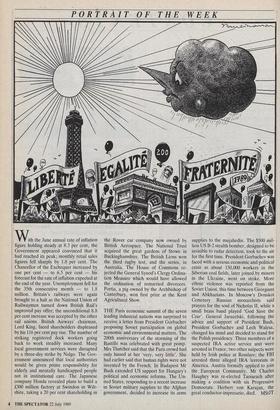PORTRAIT OF THE WEEK
With the June annual rate of inflation figure holding steady at 8.3 per cent, the Government appeared convinced that it had reached its peak; monthly retail sales figures fell sharply by 1.8 per cent. The Chancellor of the Exchequer increased by one per cent — to 6.5 per cent — his forecast for the rate of inflation expected at the end of the year. Unemployment fell for the 35th consecutive month — to 1.8 million. Britain's railways were again brought to a halt as the National Union of Railwaymen turned down British Rail's improved pay offer; the unconditional 8.8 per cent increase was accepted by the other rail unions. British Airways' chairman, Lord King, faced shareholders displeased by his 116 per cent pay rise. The number of striking registered dock workers going back to work steadily increased. Many local government services were disrupted by a three-day strike by Nalgo. The Gov- ernment announced that local authorities would be given prime responsibility for elderly and mentally handicapped people not in institutional care. The Japanese company Honda revealed plans to build a £300 million factory at Swindon in Wilt- shire, taking a 20 per cent shareholding in
the Rover car company now owned by British Aerospace. The National Trust acquired the great gardens of Stowe in Buckinghamshire. The British Lions won the third rugby test, and the series, in Australia. The House of Commons re- jected the General Synod's Clergy Ordina- tion Measure which would have allowed the ordination of remarried divorcees. Portia, a pig owned by the Archbishop of Canterbury, • won first prize at the Kent Agricultural Show.
THE Paris economic summit of the seven leading industrial nations was surprised to receive h letter from President Gorbachev proposing Soviet participation on global economic and environmental matters. The 200th anniversary of the storming of the Bastille was celebrated with great pomp. Mrs Thatcher said that the Paris crowd had only hissed at her 'very, very little'. She had earlier said that human rights were not invented by the French. In Budapest Mr Bush extended US support for Hungary's political and economic reforms. The Un- ited States, responding to a recent increase in Soviet military supplies to the Afghan government, decided to increase its arms
supplies to the mujahedin. The $500 mil- lion US B-2 stealth bomber, designed to be invisible to radar detection, took to the air for the first time. President Gorbachev was faced with a serious economic and political crisis' as about 150,000 workers in the Siberian coal fields, later joined by miners in the Ukraine, went on strike. More ethnic violence was reported from the Soviet Union, this time between Georgians and Abkhazians. In Moscow's Donskoi Cemetery Russian monarchists said prayers for the soul of NicholaS II, while a small brass band played 'God Save the Czar'. General Jaruzelski, following the advice and support of President. Bush. President Gorbachev and Lech Walesa. changed his mind and decided to stand for the Polish presidency. Three members of a suspected IRA active service unit were arrested in France; two other suspects were held by Irish police at Rosslare; the FBI arrested three alleged IRA 'terrorists in America. Austria formally applied to join the European Community. Mr 'Charles Haughey was re-elected Taoiseach after Making a coalition with six Progressive Democrats. Herbert von Karajan, the great conductor-impresario, died. MStJT


















































 Previous page
Previous page